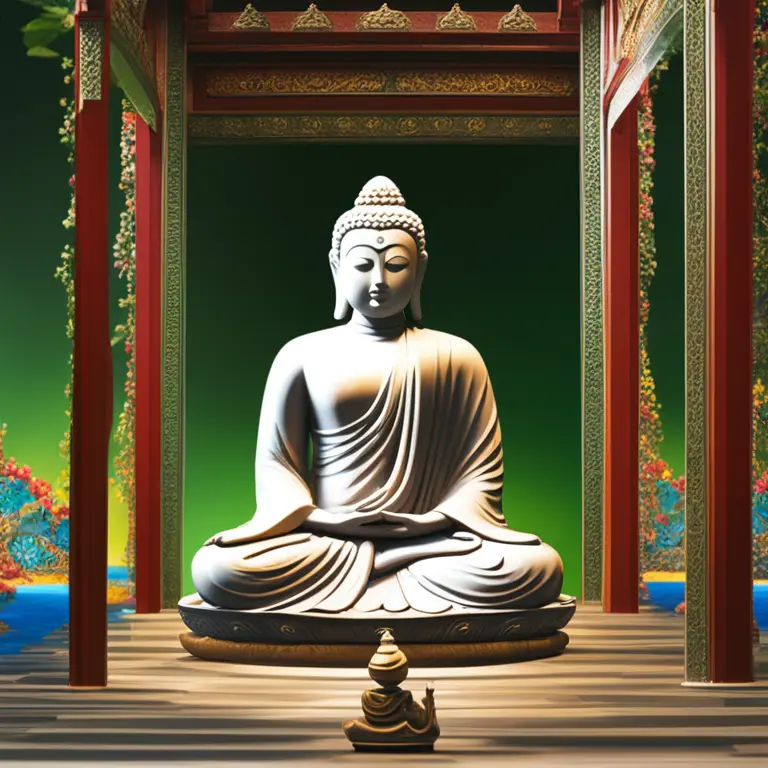
Calming the Storm Within: Meditation Techniques for Anger Management
Discover effective meditation techniques for managing anger and cultivating a peaceful mind in this comprehensive guide.
article by Hina Kurosawa
Meditation and Anger: An Introduction
Meditation has long been revered as a powerful tool for cultivating inner peace and emotional balance. As contemporary lifestyles become increasingly fast-paced and stress-laden, many individuals are turning to meditation to cope with intense emotions, including anger. Understanding the true nature of anger is essential. It's often a secondary emotion, masking deeper feelings of hurt, frustration, or fear. By addressing the root causes of anger through meditation, one can learn to acknowledge these underlying emotions non-judgmentally and find healthier ways to respond to life's provocations.

The Breath as an Anchor
One of the simplest yet most profound meditation techniques for anger management involves focusing on the breath. Deep, diaphragmatic breathing, where one breathes slowly into the belly, can act as a physical antidote to the fight-or-flight response typically triggered by anger. Techniques, such as the 4-7-8 method—inhaling for 4 seconds, holding for 7, and exhaling for 8—can be exceedingly helpful to reverse the escalation of anger, by engaging the body's relaxation response and bringing the nervous system back to equilibrium.

Mindfulness: Observing without Judgment
Mindfulness meditation teaches practitioners to observe their thoughts and emotions without immediate reactions or judgments. As one becomes more adept at mindfulness, they can witness their anger rise and fall like waves in the ocean, without being pulled under by them. This detached observation allows for a gap between stimulus and response, offering a chance to choose a calmer, more measured reaction to situations that might typically provoke anger.

Compassionate Reflections
Cultivating compassion through meditation can transform the energy of anger into positive, empathetic action. By practicing loving-kindness meditation (Metta), where one silently sends wishes of well-being to themselves and others, the heart's capacity for compassion is expanded. This practice can include those one is angry with, which might be challenging, but it is often through this difficulty that the most profound healing occurs.
Body Scan for Releasing Tension
A body scan meditation can be particularly useful for those who experience physical symptoms of anger, such as muscle tension or a clenched jaw. By mentally scanning down the body and inviting relaxation into each area, starting from the top of the head and moving down to the toes, one can often release the physical manifestations of anger, helping to defuse aggressive impulses before they escalate into actions one might regret.
Visualization for Cooling Emotions
Visualization is a tranquil escape for the mind that can assist in anger management. Imagining oneself in a serene place—perhaps a quiet beach or a forest clearing—can help replace the mental imagery that accompanies anger with calming scenes. This switch can significantly shift one's emotional state from anger to peace, and with practice, can become a go-to refuge in moments of potential conflict.
Creating a Routine
To effectively harness the benefits of meditation for anger management, creating a routine is crucial. Regular practice promotes a sense of calm that pervades daily life and improves one's ability to approach potentially volatile situations with a cool head. Aim for at least 10 minutes daily, and gradually increase the duration of meditation sessions as one becomes more comfortable and attuned to the practice.
Integration into Everyday Life
Finally, incorporating meditation into day-to-day activities can reinforce a non-angry response to situations that typically incite ire. So-called 'spot meditations', brief moments of mindfulness or deep breathing during the day, can be integrated effortlessly and act as immediate remedies before anger gains momentum. Over time, these practices become second nature, transforming reactive habits into reflective responses.
Published: 2/12/2024
Modified: 2/12/2024
More predictions
Come back here soon to learn more about yourself and your future


The Spectrum of Meditation Practices
Delve into the diverse world of meditation techniques to enhance mindfulness, focus, and tranquility in your daily life.


Diverse Meditation Techniques for Inner Tranquility
Explore a concise guide to diverse meditation techniques designed for fostering inner peace and mindfulness in the modern world.


Diverse Meditation Techniques for Modern Practitioners
Discover a range of meditation methods suited for contemporary lifestyles, offering pathways to inner peace and clarity.